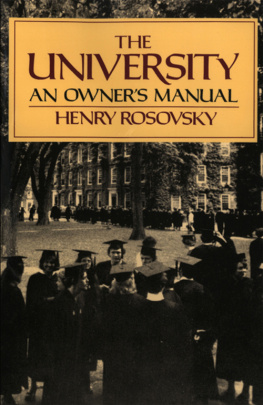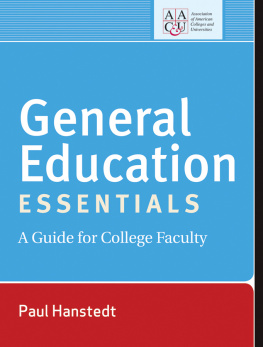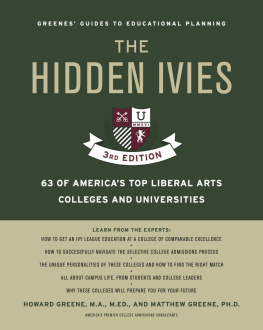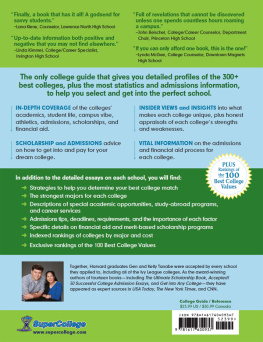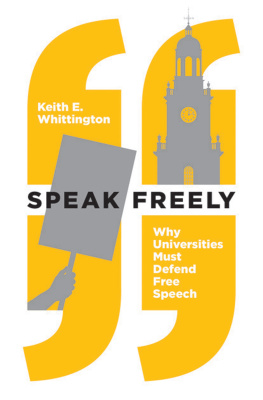Rosovsky - The university: an owners manual
Here you can read online Rosovsky - The university: an owners manual full text of the book (entire story) in english for free. Download pdf and epub, get meaning, cover and reviews about this ebook. City: New York, year: 1991, publisher: W. W. Norton & Company, genre: Politics. Description of the work, (preface) as well as reviews are available. Best literature library LitArk.com created for fans of good reading and offers a wide selection of genres:
Romance novel
Science fiction
Adventure
Detective
Science
History
Home and family
Prose
Art
Politics
Computer
Non-fiction
Religion
Business
Children
Humor
Choose a favorite category and find really read worthwhile books. Enjoy immersion in the world of imagination, feel the emotions of the characters or learn something new for yourself, make an fascinating discovery.
The university: an owners manual: summary, description and annotation
We offer to read an annotation, description, summary or preface (depends on what the author of the book "The university: an owners manual" wrote himself). If you haven't found the necessary information about the book — write in the comments, we will try to find it.
Superb. . . . Rosovsky has written an important bookprobing, wise, shrewd, fair. . . . Deserves to be widely read. James O. Freeman, Washington PostA view of Americas colleges and universities and how they are run, the challenges they face and the issues that affect their owners - students, faculty, alumni, trustees and others. Among the issues covered are tenure, the admission process in elite institutions and curriculum.
The university: an owners manual — read online for free the complete book (whole text) full work
Below is the text of the book, divided by pages. System saving the place of the last page read, allows you to conveniently read the book "The university: an owners manual" online for free, without having to search again every time where you left off. Put a bookmark, and you can go to the page where you finished reading at any time.
Font size:
Interval:
Bookmark:

For Leah
Judy
Michael
and Benjamin 09
Before turning to what readers will probably consider a set of opinionated chapters (I have the sense that every group will approve what is said about others), a bit of autobiographical information might be helpful. I am seeking to establish my credentials.
In that part of the world in which so much of my early professional personality was formed, Japan, a formal letter of introduction is de rigueur. When seeking an interview or a hearing it is most important to arrive with or be preceded by such a document, whenever possible composed by someone possessing a lot of face. The contents may vary. Sometimes much attention is devoted to lineage and family connections. At other times, the introducer vouches for the subjects professional accomplishments. Always the fundamental purpose is the same: to personalize an awkward and stiff initial encounter.
I propose to follow this civilized Japanese custom, and will present the required letter, unusual in only one particularit will be a self-introduction. Perhaps I should have tried to get a big name to write on my behalf, but after considering a variety of possibilities I decided that the advantages are largely on my side. The relevant facts are known to me as to no one else and frankly I prefer my own interpretations. Autobiography tends to be self-serving, but then I do not intend to make a fetish of objectivity here at the beginning or in the balance of the volume. This is unabashedly a book of opinions and of observations based on my own individual experiences. Let us begin.
Dear Sir or Madam:
I have the pleasure of presenting Mr. Henry Rosovsky, who is the Lewis P. and Linda L. Geyser University Professor at Harvard University. His title, quite a mouthful, is intended to be impressive, but do remember that universities are institutions that love hierarchies and distinctions at least as much as the military. He is also the former Dean of Harvards Faculty of Arts and Sciences, a post frequently described somewhat arrogantly in Cambridge, Massachusettsalas, rarely elsewhereas the best and most important academic job in America. For the rest of his life and beyond he will always carry the tag former. In ones early sixties that should not be an inordinate burden.
HRs university career has been varied and eventful. He was an undergraduate at the College of William and Mary, and a graduate student at Harvard. His first teaching post was at the University of California at Berkeley in 1958, where he studied and researched Japanese economic growth at a time when the subject was far less on the public mind than today. As an area specialist, he always lived under a professional cloud: economists were generous in their praise of his knowledge of things Japanese, and orientalists were prepared to testify to his excellence as an economist. Since these two groups hardly ever met, HR ledfor some timethe quiet, untroubled life of a scholar.
The late 1950s and early 1960s were wonderful years for public higher education in California. University expansion and taxpayer generosity created an air of optimism. Achieving tenurea lifetime contract and the goal of every professorrequired only reasonable brightness and moderate industry. Add the California climate; what else could one want?
This idyllic phase ended abruptly during the academic year 196465. Berkeley happened to be the birthplace of the American student revolution. Nearly twenty-five years after the event, the causes of this important social phenomenon are sometimes still disputed. Vietnam and the civil rights movement played major roles. A certain revulsion against the impersonality of large organizations was also important. Remember the revolutionary slogan: do not fold, spindle, or mutilate! Another contributing factor was the inexperience of universities in managing sudden student unrest that now took the form of attacks on institutions that considered themselves non-political and neutral. But for present purposes, the causes do not matter. The consequences were unambiguous from the very beginning: an entirely new and most unsettled atmosphere. Mass meetings, building occupations, police actions, non-negotiable demands that led to perpetual negotiations, interminable faculty meetings full of bombastic political rhetoriccertainly not a setting in which to pursue knowledge, at least the sort of knowledge traditionally associated with universities.
At this point, HR made a very poor forecast, an achievement frequently shared with many prominent members of the economics profession. Being largely raised in the East, and born in Europe, he had a natural skepticism about California: the sunshine was rather monotonous, the population rootless, and all things odd and trendy seemed to flourish in this strange environment. Berkeley had exploded, but surelyhe believedthese unfortunate events would never be repeated in the more established institutions on the East Coast. In the Ivy League and similar places, students and professors still wore jackets and ties, older people sometimes were addressed as Sir. Civility prevailed. Most of all, teaching and research remained undisturbed. I might add that he also sensed in himself a dangerous inability to remain disengaged from university affairs. Despite his loudly announced dislike of negotiations, faculty rhetoric, and committees, when crisis came to Berkeley he contributed more than his share to all of these social ills. It could be said that in doing so HR behaved like so many other professors: claiming to yearn for peace and quiet in the library while never missing an opportunity to engage in academic politics or games of power. Of course, he would urge a different interpretation: one that stresses love of institutions, citizenship, moral values.
At any rate, toward the end of the academic year 196465 HR resigned his professorship in economics and history at the University of California and joined that small group of West Coast refugees, largely social scientists, searching for traditional tranquility. Given the prosperity of the times, a number of attractive invitations arrived. He chose his old graduate school, Harvard University.
Harvard had always exerted a major influence on HR. As an undergraduate he had studied economics and history at the College of William and Mary (class of 1949), a four-year school thatin those daysemphasized good teaching and a good time. Professors were approachable, conscientious, sometimes even inspiring. Southern friendlinessquite genuinewas a major asset. William and Mary was founded in 1693, only fifty-seven years after Harvard initiated higher education in America. Our countrys second oldest college, it attempted to make much of its heritage. But the appeal to tradition had a slightly hollow ring in the 1940s. Perhaps in the eighteenth century William and Mary and Harvard could be viewed as a pair. Few would agree with that after the Civil War, although in recent years William and Mary gained renewed respect as a public ivy.
Harvard was special to a new graduate student in 1949 not because it now represents the good old days or the period of HRs youth. Its essential qualities have remained unchanged. First, a faculty that continually seeks to create new ideas and knowledge; the people who wrote the books stood at the lectern. Second, students from every state and many foreign countries selected by rigorous standardsa diverse, contentious, and marvelously stimulating cohort. Third, a disdain for orthodoxy and school solutions combined with a great admiration for excellence. And finally, a meaningful tradition: by today, over 350 years of virtually uninterrupted progress.
Groucho Marx once said that he would not wish to belong to any club that would have him as a member. Harvards invitation forcibly brought this thought to mind. HR had an exaggerated esteem for members of the Harvard facultyit would not last unabated for longand he briefly wondered whether he really deserved a place in that august company.
Next pageFont size:
Interval:
Bookmark:
Similar books «The university: an owners manual»
Look at similar books to The university: an owners manual. We have selected literature similar in name and meaning in the hope of providing readers with more options to find new, interesting, not yet read works.
Discussion, reviews of the book The university: an owners manual and just readers' own opinions. Leave your comments, write what you think about the work, its meaning or the main characters. Specify what exactly you liked and what you didn't like, and why you think so.

